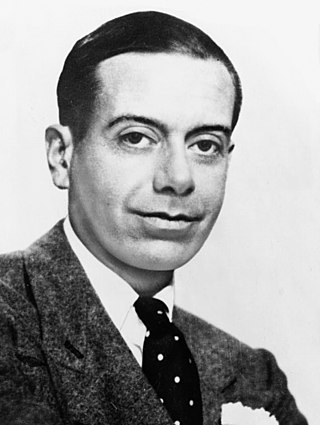
Cole Albert Porter was an American composer and songwriter. Many of his songs became standards noted for their witty, urbane lyrics, and many of his scores found success on Broadway and in film.

Kiss Me, Kate is a musical written by Bella and Samuel Spewack with music and lyrics by Cole Porter. The story involves the production of a musical version of William Shakespeare's The Taming of the Shrew and the conflict on and off-stage between Fred Graham, the show's director, producer, and star, and his leading lady, his ex-wife Lilli Vanessi. A secondary romance concerns Lois Lane, the actress playing Bianca, and her gambler boyfriend, Bill, who runs afoul of some gangsters. The original production starred Alfred Drake, Patricia Morison, Lisa Kirk and Harold Lang.
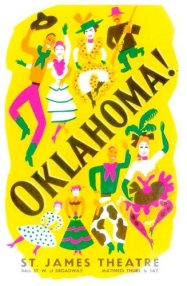
Oklahoma! is the first musical written by the duo of Rodgers and Hammerstein. The musical is based on Lynn Riggs' 1931 play, Green Grow the Lilacs. Set in farm country outside the town of Claremore, Indian Territory, in 1906, it tells the story of farm girl Laurey Williams and her courtship by two rival suitors, cowboy Curly McLain and the sinister and frightening farmhand Jud Fry. A secondary romance concerns cowboy Will Parker and his flirtatious fiancée, Ado Annie.
This is a list of notable events in music that took place in the year 1948.
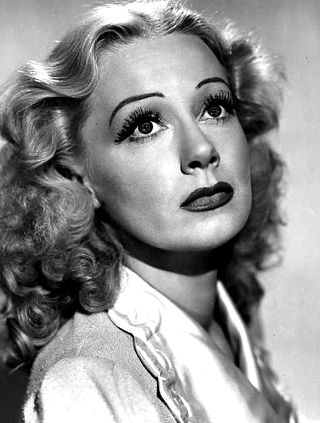
June Havoc was an American actress, dancer, stage director and memoirist.

Fifty Million Frenchmen is a musical comedy with a book by Herbert Fields and music and lyrics by Cole Porter. It opened on Broadway in 1929 and was adapted for a film two years later. The title is a reference to the hit 1927 song "Fifty Million Frenchmen Can't Be Wrong" by Willie Raskin, Billy Rose, and Fred Fisher, which compared free attitudes in 1920s Paris with censorship and prohibition in the United States. The musical's plot is consistent with the standard boy-meets-girl plots of musical comedies of the first half of the twentieth century.

Gay Divorce is a musical with music and lyrics by Cole Porter and book by Dwight Taylor, adapted by Kenneth Webb and Samuel Hoffenstein. It was Fred Astaire's last Broadway show and featured the hit song "Night and Day" in which Astaire danced with co-star Claire Luce.

Pal Joey is a 1940 musical with a book by John O'Hara and music and lyrics by Richard Rodgers and Lorenz Hart. The musical is based on a character and situations O'Hara created in a series of short stories published in The New Yorker, which he later published in novel form. The title character, Joey Evans, is a manipulative small-time nightclub performer whose ambitions lead him into an affair with the wealthy, middle-aged and married Vera Simpson. It includes two songs that have become standards: "I Could Write a Book" and "Bewitched, Bothered and Bewildered".

Mexican Hayride is a 1948 film starring the comedy team of Abbott and Costello. The film is based on Cole Porter's Broadway musical Mexican Hayride starring Bobby Clark. No songs from the stage musical were used in the film.
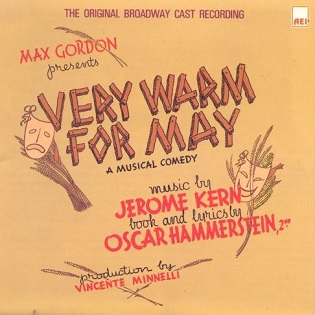
Very Warm for May is a musical composed by Jerome Kern, with a libretto by Oscar Hammerstein II. It was the team's final score for Broadway, following their hits Show Boat, Sweet Adeline, and Music in the Air. It marked a return to Broadway for Kern, who had spent several years in Hollywood writing music for movies, including Swing Time for Fred Astaire and Ginger Rogers.
Something for the Boys is a musical with music and lyrics by Cole Porter and a book by Herbert Fields and Dorothy Fields. Produced by Mike Todd, the show opened on Broadway in 1943 and starred Ethel Merman in her fifth Cole Porter musical.
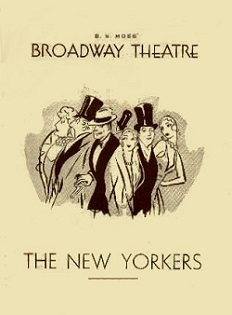
The New Yorkers is a musical written by Cole Porter and Herbert Fields (book). Star Jimmy Durante also wrote the words and music for the songs in which his character was featured.
Aladdin is a 1958 musical fantasy written especially for television, with a book by S.J. Perelman and music and lyrics by Cole Porter, telecast in color on the DuPont Show of the Month by CBS. It was Porter's last musical score. Columbia Records issued both monophonic and stereophonic recordings of the original TV cast: Cyril Ritchard, Dennis King, Basil Rathbone, Anna Maria Alberghetti, Geoffrey Holder, Sal Mineo, and Una Merkel.

You Never Know is a musical with a book by Rowland Leigh, adapted from the original European play By Candlelight, by Siegfried Geyer and Karl Farkas, with music by Cole Porter and Robert Katscher, lyrics by Cole Porter, additional lyrics by Leigh and Edwin Gilbert, directed by Leigh, and songs by others.

Around the World is a musical based on the 1873 Jules Verne novel Around the World in Eighty Days, with a book by Orson Welles and music and lyrics by Cole Porter. It involves an around-the-world adventure by Phileas Fogg. The expensive musical extravaganza opened on Broadway in May 1946 but closed after 75 performances.
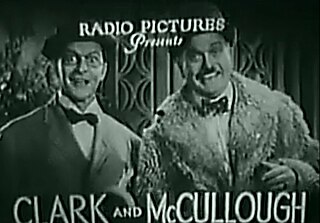
Robert Edwin Clark, known as Bobby Clark, was a minstrel, vaudevillian, performer on stage, film, television and the circus. Known for his painted-on eyeglasses, he was part of a comedy team with Paul McCullough for 36 years.

Anything Goes is a 1956 American musical film directed by Robert Lewis, and starring Bing Crosby, Donald O'Connor, Zizi Jeanmaire, and Mitzi Gaynor. Adapted from the 1934 stage musical Anything Goes by Cole Porter, Guy Bolton, and P. G. Wodehouse, the film is about two entertainers scheduled to appear in a Broadway show who travel to Europe, where each discovers the perfect leading lady for the female role. Bing Crosby's character, Bill Benson, goes to England and meets Mitzi Gaynor's character Patsy Blair, and he signs her as the female lead. Meanwhile, Donald O'Connor's character, Ted Adams, travels to France and meets Jeanmaire's character, Gaby Duval, and he signs her to the same role. On the return voyage, with each man having brought his leading lady along, the Atlantic becomes a stormy crossing when each man must tell his discovery that she might not get the role.
Hitchy-Koo of 1919 is a musical revue with music and lyrics by Cole Porter and a book by George V. Hobart. This revue was third in a series of four Hitchy-Koo Broadway revues from 1917 to 1920 produced by, and starring, Raymond Hitchcock. The revues were named after the 1912 popular song "Hitchy-Koo" by composers Lewis F. Muir and Maurice Abrahams with lyrics by L. Wolfe Gilbert; the only song which was featured in all of the Hitchy-Koo revues. The original Broadway production of this version played in 1919. The revue received favourable reviews.
Lost Musicals is a British musical theatre project established in 1989 by Ian Marshall Fisher. It is dedicated to presenting lost or forgotten musicals by famous American writers, and has been responsible for the first revivals of the lesser-known works of writers such as Stephen Sondheim, Cole Porter, Alan Jay Lerner, Richard Rodgers, Oscar Hammerstein II, Harold Arlen and Jerome Kern.
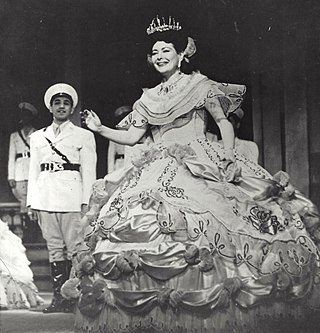
Corinna Mura was a cabaret singer, actress, and diseuse. She had a small role in the classic film Casablanca as the woman playing the guitar while singing "Tango Delle Rose" and "La Marseillaise" at Rick's Café Américain.















